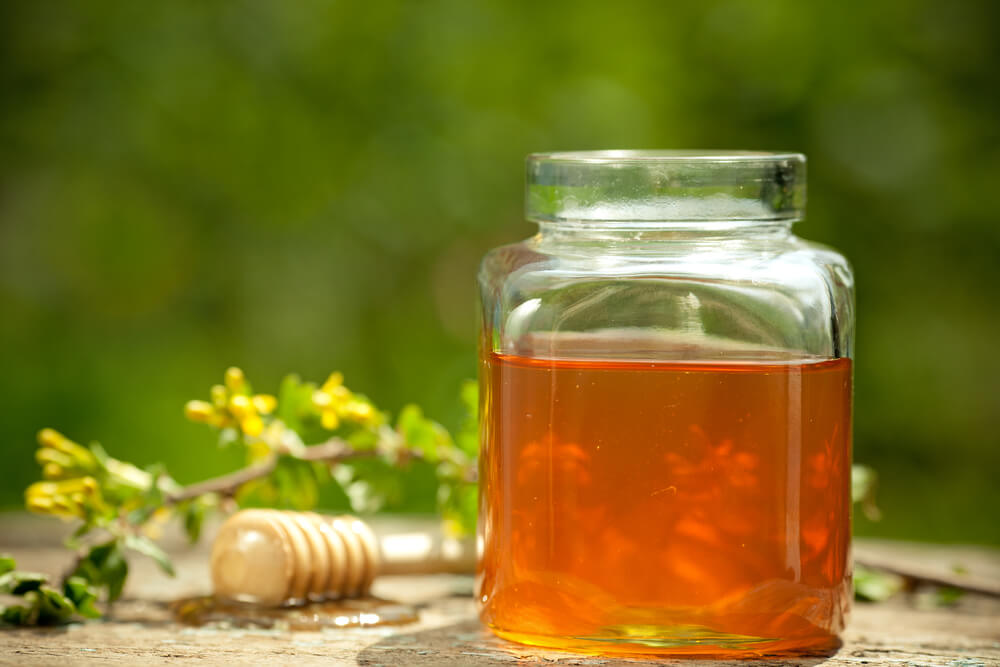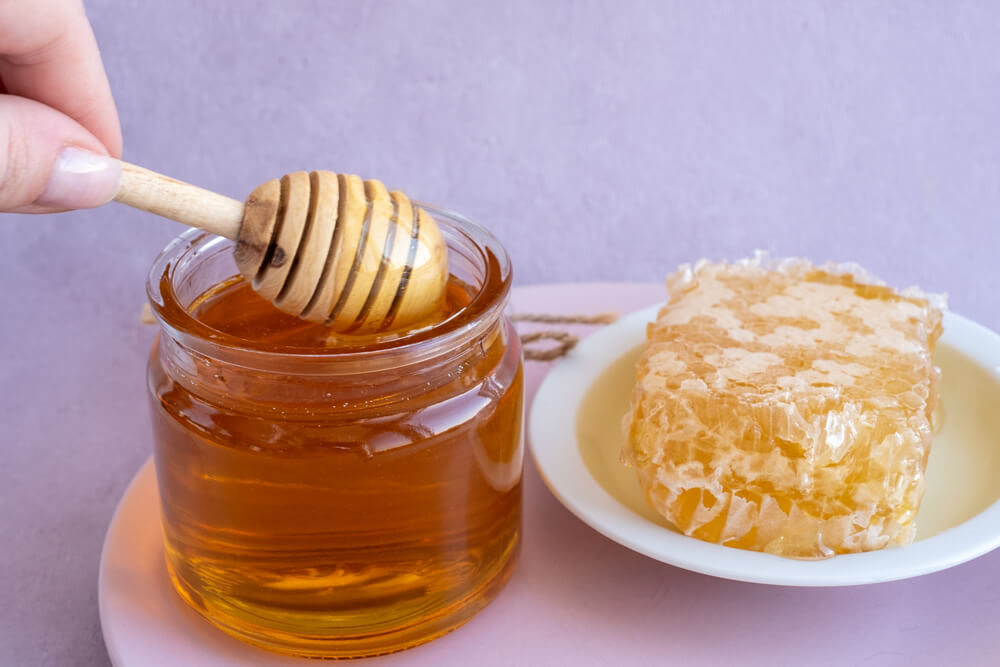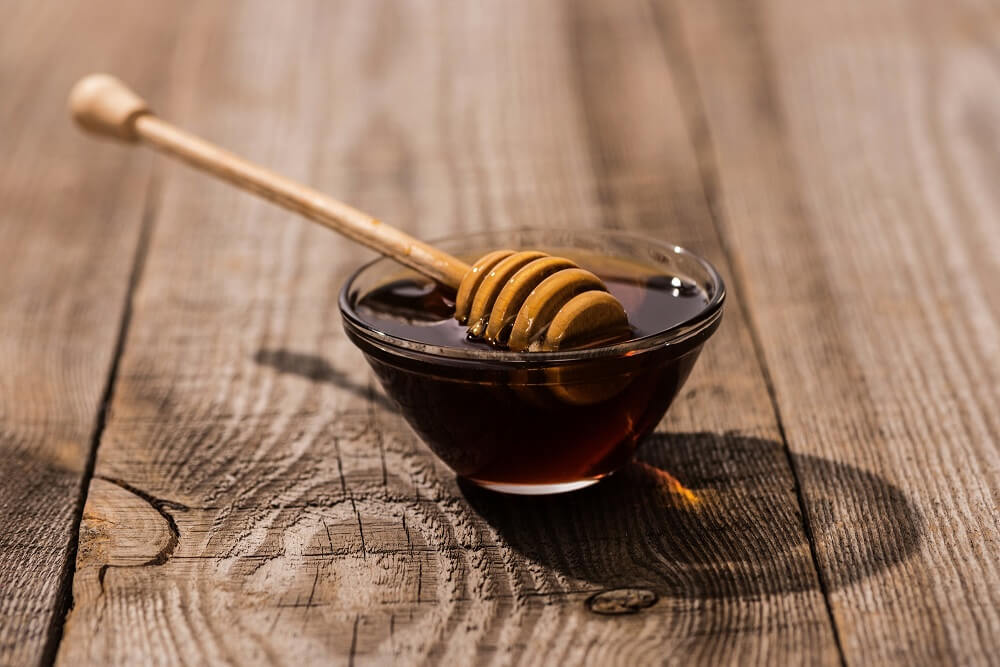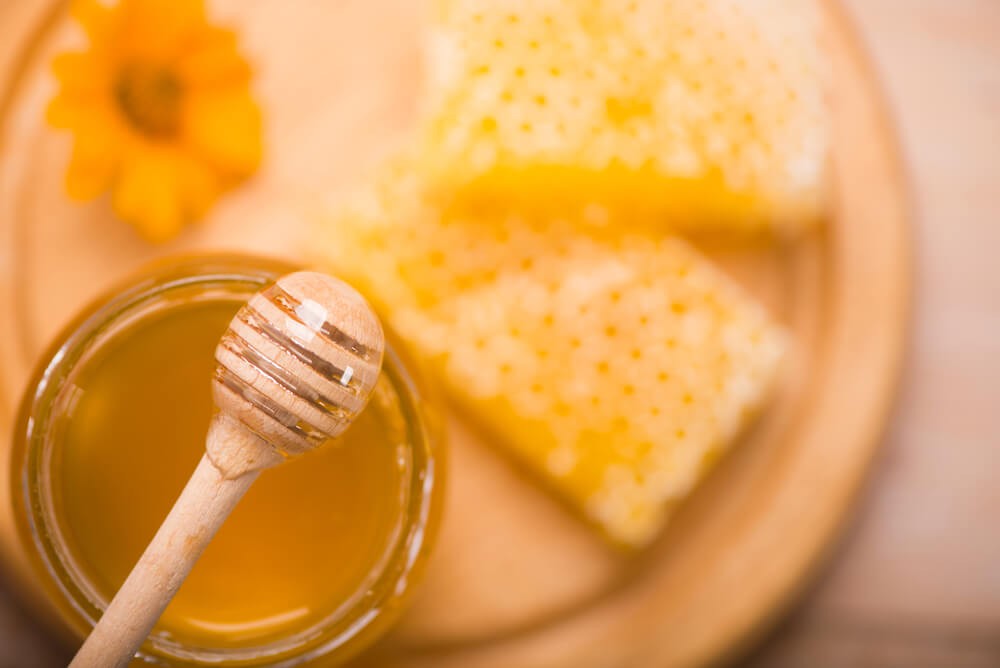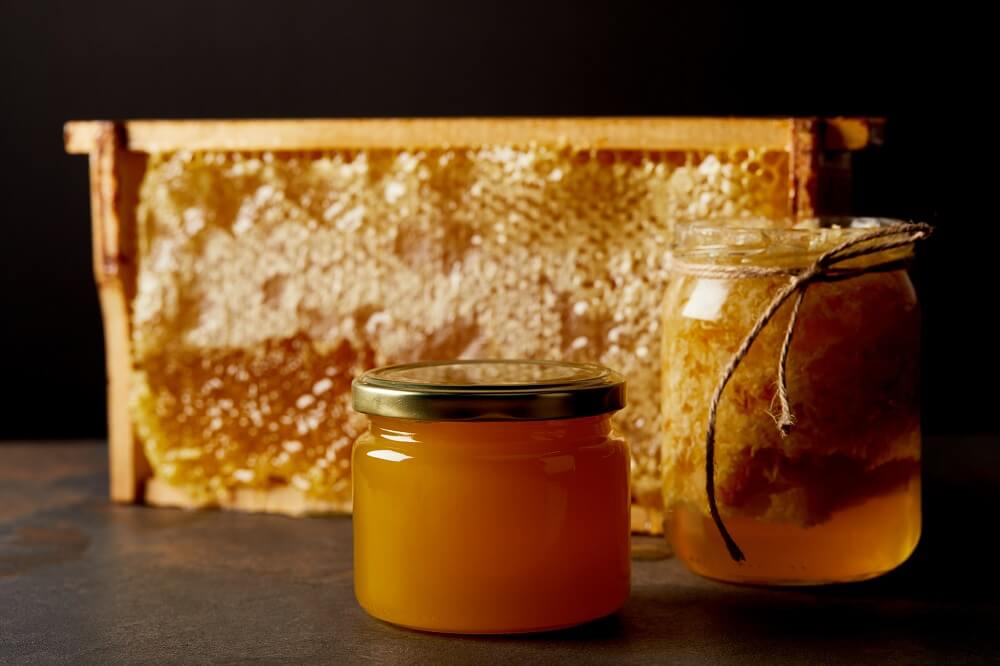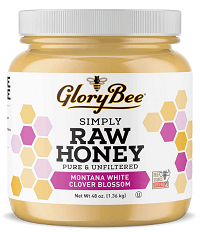Table of Contents:
What is Raw Organic Honey?
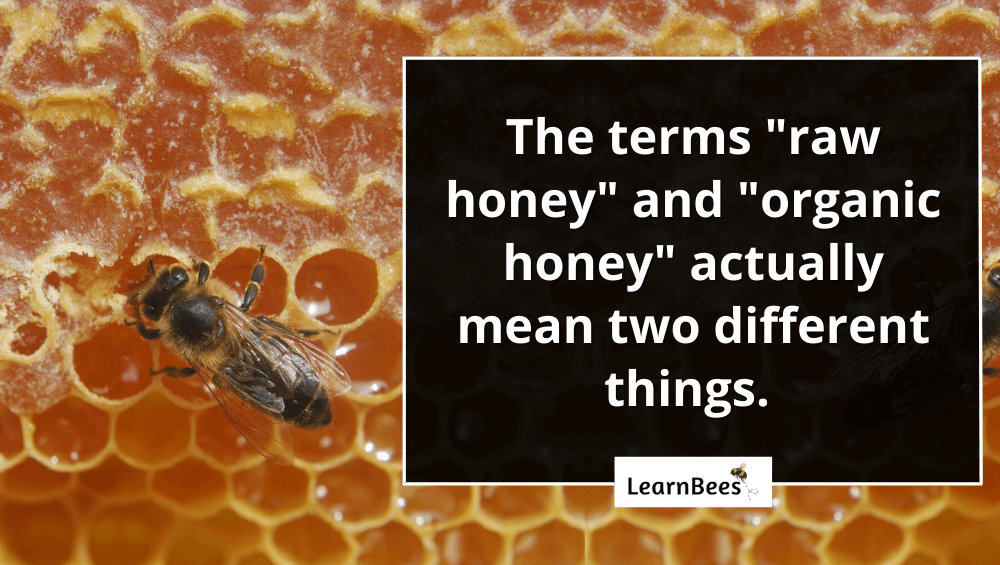
Let’s start with the basics:
Raw honey and organic honey mean two different things.
Raw honey means the honey is left in its natural state, taken directly from the honeybee hive. Raw honey hasn’t been heated, pasteurized, or mixed with other ingredients like sugar.
Organic honey is honey that’s free of chemicals such as fertilizers, pesticides, or other artificial compounds.
So, in a nutshell:
Raw organic honey is made from the nectar of organically grown plants and has been kept in its natural state just as the honeybees created it. Honey can be both raw and organic, or it could simply be one or the other.
So which one should you choose?
Thankfully, it’s pretty easy to get your hands on raw organic honey. You don’t have to choose one or the other.
That said, the most important thing is that the honey is raw. Raw honey retains all of its nutritional value, enzymes, and antioxidants that make honey a superfood. Honey is often stripped of all its health benefits during heating and pasteurization.
Additionally, some manufacturers add artificial sweeteners to their honey, which alters the taste and dilutes the benefits.
As a result?
The FDA warns that overly pasteurized honey isn’t actually real honey at all.(1)
So now the big question is:
How Do I Tell if My Honey Is Raw and Organic?
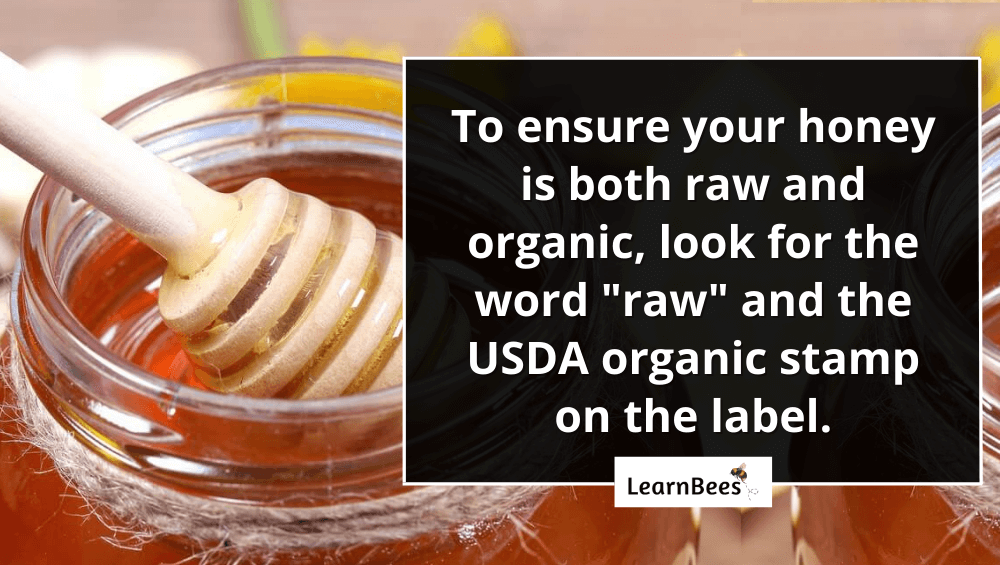
To ensure your honey is both raw and organic, look for the word “raw” and the USDA organic stamp on the label.
And here’s the thing:
Don’t become distracted by buzzwords such as “natural,” “pure,” and “real.” These words don’t necessarily mean the honey is raw or organic.
Also, keep in mind:
Many supermarkets don’t sell raw organic honey. Instead, they often sell processed honey that’s been pasteurized and diluted with other ingredients. This is because processed honey is cheap to produce, package, and sell.
As a result, you may have to find raw organic honey online, at a farmer’s market, or buy directly from a local beekeeper.
What Are the Benefits of Raw Organic Honey?
As mentioned, raw honey offers health benefits that processed honey doesn’t. This is because raw honey contains enzymes, antioxidants, and other natural ingredients that haven’t been stripped away during pasteurization.
With that in mind:
Organic honey doesn’t offer health benefits on its own. Organic honey simply means the honey didn’t come from plants treated with chemicals.
Now that we’ve got that cleared up, let’s take a closer look at the benefits of raw honey:
Benefit 1: Raw Honey Can Calm a Sore Throat and Cough
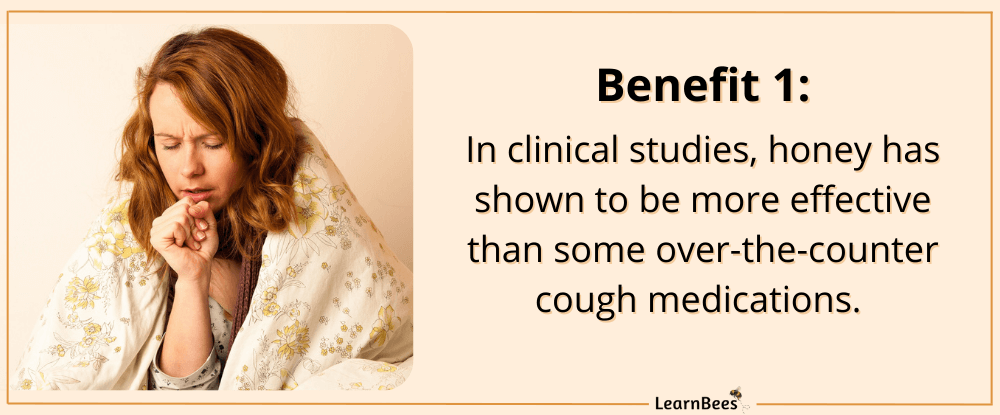
Coughing is a common concern for individuals dealing with upper respiratory infections. It can cause a sore throat and, worse, disturb your sleep.
This is where raw honey can help.
Several studies found honey more beneficial for treating cough symptoms than diphenhydramine (a cough medication ingredient). What’s more, raw honey can help shorten coughing duration, thus helping prevent throat irritation.(2)
Furthermore, many over-the-counter cough medicines have unfavorable side effects, including vision impairment, breathing difficulties, and nausea.
Raw honey doesn’t have any of these negative effects.
Honey has also been found to help improve sleep quality among children with coughs. As a result, the parents slept better once their children slept better.(3)
Honey was also found to be more effective for upper respiratory infections than other treatment alternatives in several studies.(4)
Honey’s antibacterial and anti-inflammatory properties can help alleviate a sore throat, according to another study.(5)
Benefit 2: Raw Honey Provides a Healthy Dose of Antioxidants
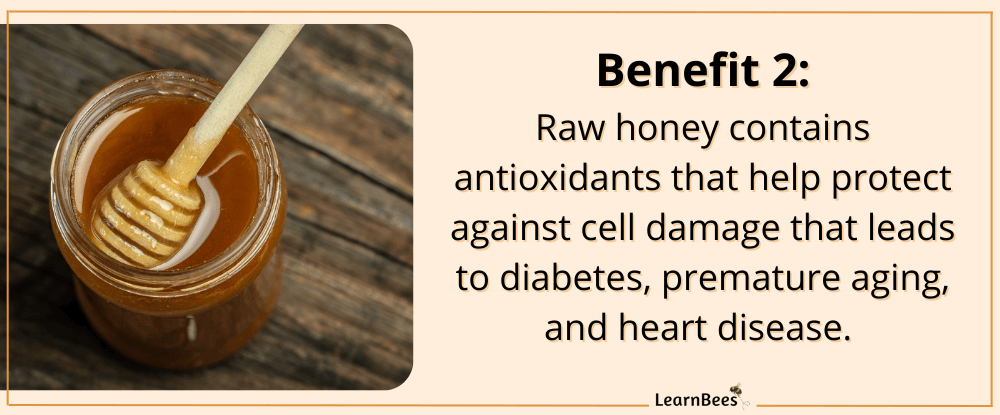
Honey’s antioxidant content accounts for a significant portion of its health benefits.
Antioxidants are molecules that assist in neutralizing harmful free radicals in the body. Free radicals are associated with aging and a variety of illnesses and cancers.
In one experiment, researchers fed 25 people four tablespoons of buckwheat honey daily, in addition to their regular diets. Blood samples were taken at the beginning and end of the experiment.(6)
After about one month, the participants had greater polyphenols levels, which are antioxidant compounds that lower the risks of certain diseases.
The more polyphenol-rich honey the individuals consumed, the greater the antioxidants in their blood were.(7, 8)
Raw honey, according to an additional study, has anti-inflammatory effects that can protect against diseases linked with oxidative stress.(9)
Propolis and bee pollen can also be present in raw honey, providing additional health benefits. Honey has been studied and shown to offer benefits for various health issues, including the cardiovascular, respiratory, gastrointestinal, and neurological systems.(10)
Benefit 3: Raw Honey is Beneficial for the Skin

Raw honey is antibacterial, antifungal, antiviral, and anti-inflammatory, making it an excellent skin treatment.
It can help with anything from minor acne blemishes to severe skin ailments like diabetes-related foot ulcers.
Honey has been shown in several studies to help heal partial-thickness burns and infected wounds caused by surgery.(11)
Honey successfully treated diabetes-related foot ulcers in a study with a 97% success rate. Such foot ulcers can be serious and lead to amputation.(12)
Honey has also been found to help with several other skin problems, including herpes, eczema, and psoriasis.(13, 14, 15)
Honey may also help with:
- Acne
- Skin rashes
- Sunburns
- Dry skin
This is why raw honey is often used in face cleansers, serums, and moisturizers.
Benefit 4: Raw Honey Can Improve Heart Health
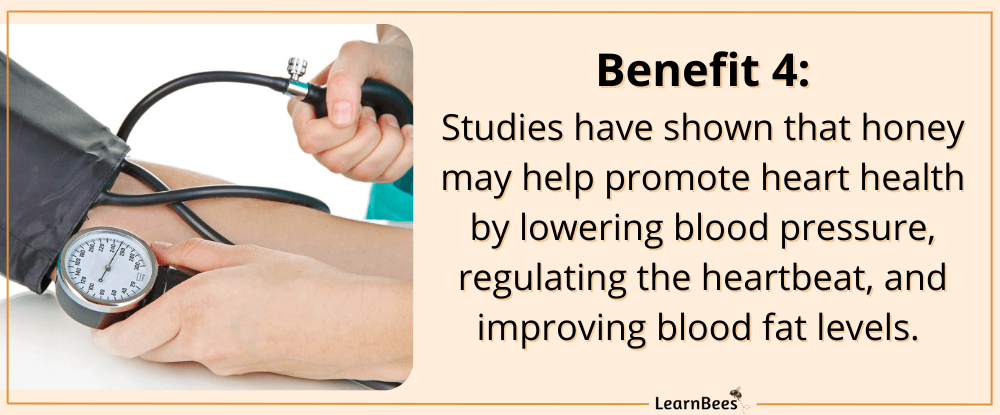
Honey may also contribute to heart health.
According to several studies, raw honey may help lower blood pressure, control your heart rate, improve blood fat levels, and protect healthy cells from dying – all factors that aid in overall cardiac health.(16)
Raw honey can also include bee propolis, which is a sticky mixture produced by honeybees from sap-producing plants. Propolis may help reduce cholesterol and triglyceride levels.(17)
Benefit 5: Raw Honey Can Improve Digestion
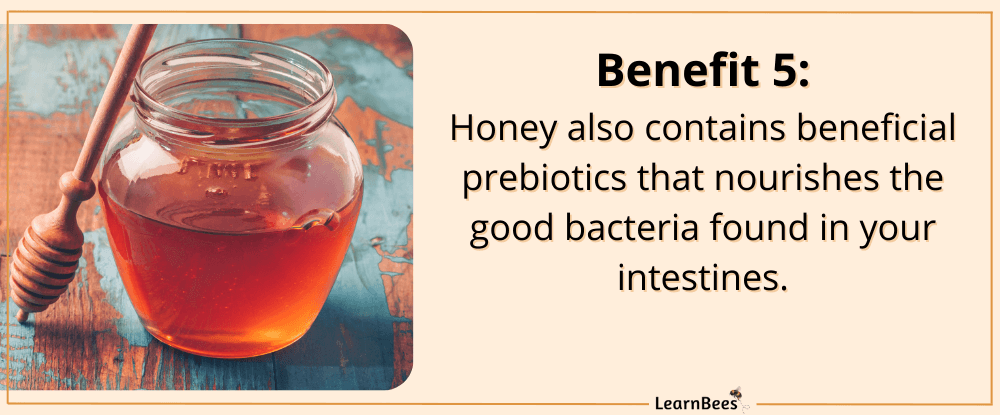
Honey has been used to treat many stomach ailments, including digestive issues such as diarrhea. Although some research shows that it works, more studies are needed to confirm. According to some researchers, honey may be able to treat Helicobacter pylori bacteria, a frequent cause of stomach ulcers.
Raw honey also contains beneficial prebiotics. These prebiotics can help the beneficial bacteria that reside in your intestines. This is advantageous for both digestion and general well-being.
FAQs on Raw Organic Honey
- Is raw organic honey good for you?
- What is the difference between raw honey and organic honey?
- Which honey is better organic or raw?
- Which raw honey is healthiest?
- Does raw honey need to be refrigerated?
- What does raw honey do to your body?
- How much raw honey should I eat a day?
- Is a spoonful of honey a day good for you?
- Is it good to drink warm water with honey in the morning?
- Can raw honey make you sick?
- How long is raw honey good for?
- Is raw honey and pure honey the same thing?
- How do I know if my honey is real?
- Is honey worse than sugar?
Is raw organic honey good for you?
Yes, raw organic honey is good for you. It’s a natural source of sugar and contains enzymes, minerals, and antioxidants. Raw honey also has antibacterial, antifungal, and anti-inflammatory properties.
To get the health benefits of honey, ensure the label says “raw.” Ignore buzzwords like “pure,” “natural,” or “real.” Such words don’t necessarily mean the honey is raw and unpasteurized.
—> Go back to the FAQs on raw organic honey
More to Explore:
- Honey Pasteurization: Does it Ruin Raw Honey?
- Honey for Skin Benefits: Directions, Uses, & Risks
- 8 Scientific Benefits of Raw Honey
What is the difference between raw honey and organic honey?
Raw honey and organic honey actually mean two different things.
Raw honey is honey that hasn’t been heated or pasteurized. This means it still contains pollen and other beneficial compounds like antioxidants and enzymes. When honey becomes overly heated, it loses some of these health benefits.
On the other hand, organic honey comes from honeybees that collect nectar from plants that haven’t been sprayed with pesticides or other chemicals.
—> Go back to the FAQs on raw organic honey
More to Explore:
Which honey is better organic or raw?
Raw honey is the best type of honey you can buy. Whether organic or not, you always want to ensure the honey label says “raw.” Raw honey hasn’t been pasteurized or heated, so it contains pollen and other helpful compounds such as enzymes and antioxidants.
Organic honey is nice to have, but it doesn’t necessarily mean the honey is raw. You always want to make sure the honey is raw, first and foremost.
—> Go back to the FAQs on raw organic honey
More to Explore:
Which raw honey is healthiest?
Many types of raw honey are healthy. It just depends on the brand and flavor you enjoy. For example, you can get raw clover honey, raw blueberry honey, raw orange blossom honey, and so on.
—> Go back to the FAQs on raw organic honey
More to Explore:
Does raw honey need to be refrigerated?
No, honey can be stored at room temperature.
In fact, it’s best to store honey in a dark place like a pantry or cupboard. If you do refrigerate raw honey, it’ll crystallize faster due to the cold temperatures. However, crystallized honey isn’t expired or bad for you—it just means the honey has gone from liquid to solid.
—> Go back to the FAQs on raw organic honey
More to Explore:
What does raw honey do to your body?
Raw honey has many benefits for your body. It’s a natural energy source and contains vitamins, minerals, and antioxidants. Raw honey also has antifungal, antibacterial, and anti-inflammatory properties.
Besides that, raw honey has many other health benefits. For example, it can help improve digestion, promote heart health, and reduce sore throats and coughing duration.
—> Go back to the FAQs on raw organic honey
More to Explore:
How much raw honey should I eat a day?
Most people eat one to two tablespoons of raw honey either morning or night. You can eat the honey directly or mix it into a beverage like warm water or herbal tea.
—> Go back to the FAQs on raw organic honey
More to Explore:
- The Top 3 Best Manuka Honey Brands
- Orange Blossom Honey: Uses, Benefits, & Risks
- Sourwood Honey: Uses, Benefits, & Risks
Is a spoonful of honey a day good for you?
Yes, honey is considered safe and healthy for most people to eat. However, if you’re allergic to honey or have diabetes, you should speak to your doctor before adding honey to your diet.
Honey offers health benefits compared to sugar, but it can still spike blood sugar levels. Therefore, people with diabetes should be cautious when eating honey.
—> Go back to the FAQs on raw organic honey
More to Explore:
Is it good to drink warm water with honey in the morning?
Yes, drinking warm water with honey in the morning can help improve digestion, reduce inflammation, and boost your immune system.
If you’re looking to improve your digestion, adding honey to warm water can help. The combination of the two can help hydrate you and reduce inflammation in the gut.
Honey is also known for its antibacterial properties. This means it can help fight off skin infections and boost your immune system.
—> Go back to the FAQs on raw organic honey
More to Explore:
- The Brutally Honest Truth About Sour Honey
- Buckwheat Honey: Uses, Benefits, & Risks
- Can You Eat Honeycombs?
Can raw honey make you sick?
Raw honey is considered safe for most people. However, honey should not be given to children under one year old because of the risk of botulism poisoning. Infant botulism is a rare but severe form of food poisoning. Once children are over one year old, they can safely eat raw honey.
Raw honey isn’t ideal for individuals who have strong pollen allergies as it can agitate their symptoms. Raw honey can have small traces of pollen in it.
—> Go back to the FAQs on raw organic honey
More to Explore:
How long is raw honey good for?
“How long is raw honey good for once opened?” is a common question we get.
The good news is that raw honey doesn’t expire if stored correctly. Keeping raw honey in a dark place like a cabinet can make it last for years— or even decades.
That being said, raw honey may change in color, texture, and flavor over time. These changes don’t mean the raw honey has gone bad, though.
—> Go back to the FAQs on raw organic honey
More to Explore:
Is raw honey and pure honey the same thing?
Not necessarily.
“Raw honey” is honey that hasn’t been heated or processed, so it keeps all its health benefits.
Words like “pure,” “natural,” and “real” don’t necessarily mean the honey is raw. To ensure you’re getting raw honey, check the label to ensure it says, “raw honey.’
—> Go back to the FAQs on raw organic honey
More to Explore:
- Fermented Garlic and Honey Recipe
- Cinnamon Honey: Are There Health Benefits?
- How to Substitute Honey for Sugar
How do I know if my honey is real? How can you tell if honey is raw?
The best place to get raw honey is from a local beekeeper or farmers’ market. Additionally, you can buy raw honey online by ensuring the label says “raw.”
—> Go back to the FAQs on raw organic honey
More to Explore:
- What’s the Melting Point of Beeswax?
- Is Honey Acidic or Alkaline?
- Beeswax on Hair: Benefits, Risks, & How to Use It
Is honey worse than sugar?
No, honey is healthier than sugar, thanks to its antibacterial, anti-inflammatory, and antioxidant properties. However, honey still contains natural sugars.
Therefore, it’s essential to eat raw honey in moderation. Too much honey can still lead to blood sugar spikes.
